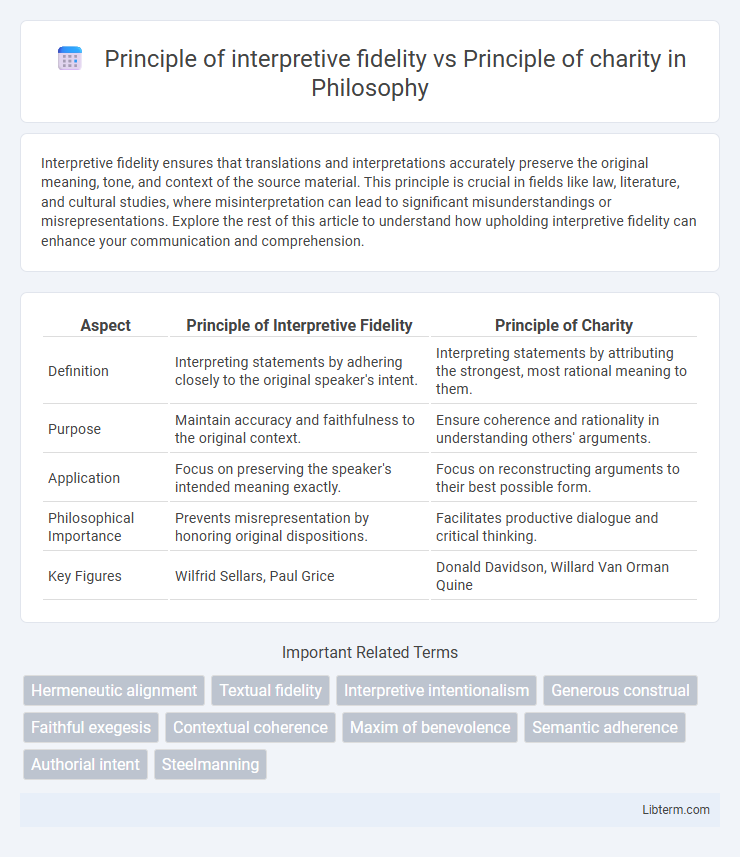Interpretive fidelity ensures that translations and interpretations accurately preserve the original meaning, tone, and context of the source material. This principle is crucial in fields like law, literature, and cultural studies, where misinterpretation can lead to significant misunderstandings or misrepresentations. Explore the rest of this article to understand how upholding interpretive fidelity can enhance your communication and comprehension.
Table of Comparison
| Aspect | Principle of Interpretive Fidelity | Principle of Charity |
|---|---|---|
| Definition | Interpreting statements by adhering closely to the original speaker's intent. | Interpreting statements by attributing the strongest, most rational meaning to them. |
| Purpose | Maintain accuracy and faithfulness to the original context. | Ensure coherence and rationality in understanding others' arguments. |
| Application | Focus on preserving the speaker's intended meaning exactly. | Focus on reconstructing arguments to their best possible form. |
| Philosophical Importance | Prevents misrepresentation by honoring original dispositions. | Facilitates productive dialogue and critical thinking. |
| Key Figures | Wilfrid Sellars, Paul Grice | Donald Davidson, Willard Van Orman Quine |
Introduction to Interpretive Fidelity and the Principle of Charity
Interpretive fidelity emphasizes understanding a speaker's intended meaning as accurately as possible without distortion, ensuring interpretations remain true to their original context and purpose. The Principle of Charity requires interpreting statements in the most rational and coherent way, attributing the strongest possible sense to the speaker's argument to avoid misunderstandings. Balancing these principles enhances effective communication by promoting fairness and clarity in interpreting others' expressions.
Defining Interpretive Fidelity in Philosophical Discourse
Interpretive fidelity in philosophical discourse demands accurately representing an author's arguments and intentions, avoiding distortion or oversimplification. This principle ensures that interpretations remain true to the original context and meaning while engaging critically with the material. Distinct from the Principle of Charity, which emphasizes interpreting arguments in their strongest form, interpretive fidelity prioritizes faithfulness to the text's actual content and intended message.
Understanding the Principle of Charity: A Conceptual Overview
The Principle of Charity requires interpreting a speaker's statements in the most rational and coherent way possible, attributing the strongest, most reasonable meaning to their words to enhance understanding and respectful dialogue. This interpretive strategy contrasts with the Principle of Interpretive Fidelity, which emphasizes staying as true as possible to the speaker's intended meaning even when it seems less rational or coherent. Emphasizing the Principle of Charity improves communication by fostering clearer comprehension and reducing misunderstandings in philosophical and everyday discourse.
Origins and Historical Development of Both Principles
The Principle of Interpretive Fidelity emerged from the field of hermeneutics, emphasizing a faithful understanding of the original speaker's intended meaning, rooted in 20th-century philosophical discourse. The Principle of Charity, credited to philosophers like Donald Davidson, developed within analytic philosophy to ensure the most rational and coherent interpretation of a speaker's statements. Both principles evolved as foundational tools in linguistic philosophy and hermeneutics to navigate ambiguity and foster mutual understanding in communication.
Key Differences: Interpretive Fidelity vs. Principle of Charity
The Principle of Interpretive Fidelity emphasizes understanding and representing a speaker's statements as accurately and contextually faithful as possible, prioritizing their original intent and meaning. In contrast, the Principle of Charity urges interpreters to attribute the most rational, coherent, and truthful interpretation to statements, often assuming the speaker is logical and sincere even if their words are unclear or flawed. The key difference lies in Interpretive Fidelity valuing faithful representation over interpretive generosity, whereas the Principle of Charity prioritizes coherence and rationality, sometimes at the expense of literal accuracy.
Practical Applications in Textual and Argument Analysis
The Principle of Interpretive Fidelity emphasizes accurately representing an author's intended meaning in textual analysis, ensuring interpretations align closely with original context and purpose. The Principle of Charity requires interpreting arguments in their strongest and most coherent form, promoting constructive critique and preventing misrepresentation. Employing both principles enhances clarity, rigor, and fairness in argument evaluation, fostering effective communication and critical thinking.
Strengths and Limitations of Interpretive Fidelity
Interpretive fidelity ensures a close adherence to the original speaker's intentions and contextual meanings, preserving the authentic voice and preventing misrepresentation. Its strength lies in accurately reflecting complex or culturally specific ideas, but it can limit broader understanding when the original intent is ambiguous or internally contradictory. This principle may also restrict openness to alternative interpretations that could enhance comprehension or reveal implicit meanings.
Benefits and Potential Pitfalls of the Principle of Charity
The Principle of Charity enhances communication by interpreting others' statements in the strongest, most rational way, fostering understanding and reducing misinterpretations in debates or discussions. Benefits include promoting intellectual humility and enabling constructive dialogue through fair representation of opposing views. Potential pitfalls involve risking oversimplification or attributing unintended coherence, which can obscure genuine contradictions or weaknesses in arguments.
Balancing Fidelity and Charity in Interpretation
Balancing interpretive fidelity and the principle of charity involves accurately representing a speaker's intended meaning while also assuming rationality and coherence in their statements. Interpretive fidelity demands staying true to the specific context and nuances of the original message, ensuring no distortion occurs. Embracing the principle of charity requires attributing the strongest, most reasonable interpretation to the speaker's words to facilitate constructive understanding and meaningful dialogue.
Conclusion: Towards Responsible and Effective Interpretive Practice
The principle of interpretive fidelity emphasizes accurately understanding an author's intended meaning without distortion, while the principle of charity promotes interpreting statements in their strongest, most rational form to ensure fair evaluation. Responsible and effective interpretive practice balances these principles by striving for interpretations that are both truthful to the original context and maximally coherent, fostering clearer communication and reducing misunderstandings. Integrating both principles enhances intellectual integrity and respectful dialogue in academic, literary, and everyday contexts.
Principle of interpretive fidelity Infographic

 libterm.com
libterm.com